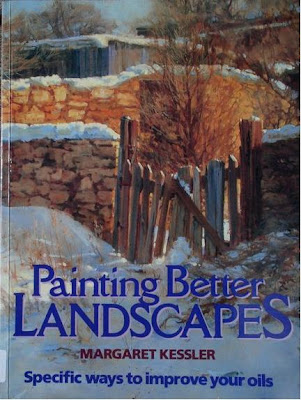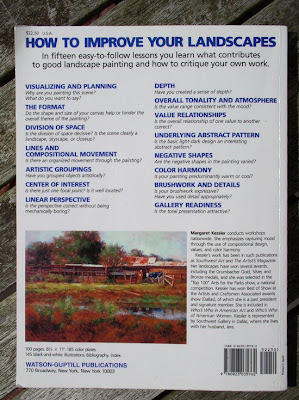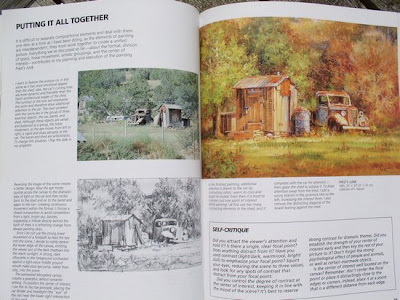“Painting Better Landscapes: Specific Ways to Improve Your Oils

The book is well structured and covers, in fifteen chapters, the following topics:
1. Visualizing and planning
2. The format
3. Division of space
4. Lines and compositional movement
5. Artistic grouping
6. Center of interest
7. Linear perspective
8. Depth
9. Overall tonality and atmosphere
10. Value relationship
11. Underlying abstract patterns
12. Negative shapes
13. Colour harmony
14. Brushwork and details
15. Gallery readiness

At the end of each section, a box lists points to consider and questions so that artists can carry out a self-critic of their work.
Margaret Kessler gives good practical advice. Don’t skip the small print by the author’s paintings. These paragraphs contain good information and are not necessarily a repeat of the main text.

This is not your typical “how to” book with step by step illustration on how to paint a particular landscape.
You know the saying: “Give a man a fish; you have fed him for today. Teach a man to fish; and you have fed him for a lifetime”. To use this metaphor, Margaret Kessler’s aim is not to give you a fish, nor to teach you how to fish but rather to improve your fishing technique so that you catch bigger and better fishes. One thing you will find in this book is food for thoughts.
You can read this book from cover to cover or one bite at a time, when you want advice on a particular topic. It is an excellence reference book to keep in your artist’s library.
Favourite quotes
These are quotes I found interesting or unusual to give you a taste of the content and style.
“Keep in mind that when you include people or animals, they generally become the center of attention. Plan the painting around them from the start. Adding people or animals at the end can be risky as they may, at the very least, distract from your intended focal point.”
Here is here advice on painting openings in buildings:
“Speaking of openings, don’t paint black holes! Create varied light and dark patterns within each opening. Reflected light bouncing around within the scene and within the building itself affects the values in these openings. They are not totally without light.”
Any negative points to consider?
- Margaret Kessler uses photographs as reference and does not discuss plein-air painting and how plein-air and studio works link together (if you are interested in these topics, then have a look at "Painting the Outdoors Inside: Capture the Vitality of Outdoor Painting in Your Studio with Oils
" by Kevin D. MacPherson). You may find this limiting, but the wealth of material in this book compensates for this.
- The author’s style of painting may not be for you. She is painting in a realistic way, with quite a lot of details. Although I did not like all the paintings, I found excellent the winter landscapes with the snow.
- Landscapes covered in this book are mainly countryside ones (no cityscapes).

“Painting Better Landscapes” by Margaret Kessler is an excellent book that will give you a practical approach to improving your landscape paintings. This is not a book for beginners, but it will give intermediate and advanced painters many bits of information to think about and tips to implement.
Related articles
- « 60 Minutes to Better Painting: Improve Your Skills in Oil and Acrylic » by Craig Nelson.
- Painting Better Landscapes: Specific Ways to Improve Your Oils
- Painting the Outdoors Inside: Capture the Vitality of Outdoor Painting in Your Studio with Oils
Painting Better Landscapes Margaret Kessler Art books Oil painting Oil painting technique Landscape painting

3 comments:
I love this book! It shares ideas and concept but never tells me how to paint. It is the first book on painting to go deeper into more complex issues to consider.
The section on Overall Tonality and Atmosphere opens a whole new door of possibility for me, and explains how to reach a look I have wanted to capture but have not been able.
So happy that I found it. Can hardly wait to apply the ideas and get out on my web site for others to comment. Thank you.
Have you written a second book? Are you teaching workshops? If so, where? Has your work changed since the book was published? Do you have a web site, so I can see more of your work?
I would also like to know if you teach workshops and where
Phoebe Smith
Post a Comment